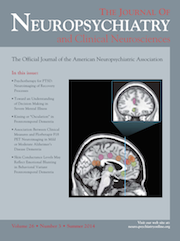The Response of Psychotic Symptoms in a Patient With Resistant Schizophrenia Under Treatment of High-Dose Risperidone Long-Acting Injection
To the Editor: Treatment-resistant schizophrenia is very difficult to treat because of the refractory characteristics toward the antipsychotic treatment. It seems not properly controlled by monotherapy of an antipsychotic. We present a case of treatment-resistant schizophrenia in a patient who experienced better control of psychotic symptoms after high-dose long-acting injection of risperidone.
Case Report
“Mr. L” is a 54-year-old man with treatment-resistant schizophrenia for 20+ years. His psychotic symptoms included auditory hallucination, delusion of persecution, delusion of being controlled, and disorganized speech and behaviors. He received several kinds of antipsychotics, including risperidone 4–6 mg/day, olanzapine 20–30 mg/day, quetiapine 600–1000 mg/day, amisulpride 800–1000 mg/day, and aripiprazole 30–45 mg/day, but without significant responses. The treatment duration of each antipsychotic was approximately 1–2 years. His compliance to the medication was poor because of his lack of insight and poor scores on measures of reality. He had frequent hospitalizations because of inadequate response to psychotic symptoms questions [Brief Psychiatric Rating Scale-18 items (BPRS-18) scores: 58, especially in items of uncooperativeness (7 points), hallucinatory behaviors (7 points), and suspiciousness (7 points)]. His self-care, social, and occupational function also did not improve [Social and Occupational Function Assessment Scale (SOFA) scores: 20]. Because of the treatment-resistant characteristics and poor insight, he started to receive long-acting injection of risperidone 37.5 mg every 2 weeks, but his psychotic symptoms still did not respond (BPRS-18 scores: 56) to the medication. The dose of long-acting injection risperidone was increased to 75 mg every 2 weeks because of resistant schizophrenia. Subsequently, his psychotic symptoms started to improve within 6 weeks (BPRS scores: 47 at second week; 41 at fourth week; 30 at sixth week). His self-care and social function also improved (SOFA scores: 23 at second week; 34 at fourth week; 45 at sixth week). No intolerable side effects were observed after the high-dose long-acting injection of risperidone.
Discussion
In this case, treatment-resistant schizophrenia was defined (despite at least two adequate trials of classic neuroleptic drugs) as having persistent, moderate to severe positive symptoms, or disorganization, or negative symptoms together with poor social and work function over a prolonged period of time. Approximately 30% (range 10%‒45%) of patients with schizophrenia meet these criteria.1 The long-acting injection of risperidone is effective for preventing the relapse of psychotic symptoms and for improving social or cognitive function.2 In addition, patients taking the long-acting injection treatment of risperidone have better outcome for global function and better retention in the treatment program.2 The long-acting injection of risperidone can influence dopamine D2 occupancy, helping patients improve their insight into their condition, which in turn would enable them to better adhere to treatment.3 The usual dose for risperidone long-term injection mostly ranged from 25 mg to 50 mg every 2 weeks, and the dose is usually increased to a maximum dose within 12 months.4 However, this patient had treatment-resistant schizophrenia; therefore, the dose was higher, and the titrating interval was shorter. No significant side effects, such as nervous system disorders and weight gain, were observed. This patient had significant improvement of psychotic symptoms and restoration of social function after high-dose long-acting injection of risperidone. The treatment strategy might be an option for treatment-resistant schizophrenia.
1 : Treatment-resistant schizophrenia—the role of clozapine. Curr Med Res Opin 1997; 14:1–20Crossref, Medline, Google Scholar
2 : Treatment retention with risperidone long-acting injection: 24-month results from the Electronic Schizophrenia Treatment Adherence Registry (e-STAR) in six countries. Curr Med Res Opin 2010; 26:501–509Crossref, Medline, Google Scholar
3 : A cross-sectional study of plasma risperidone levels with risperidone long-acting injectable: implications for dopamine D2 receptor occupancy during maintenance treatment in schizophrenia. J Clin Psychiatry 2012; 73:1147–1152Crossref, Medline, Google Scholar
4 : Explicit review of risperidone long-acting injection prescribing practice. J Clin Pharm Ther 2011; 36:651–663Crossref, Medline, Google Scholar



